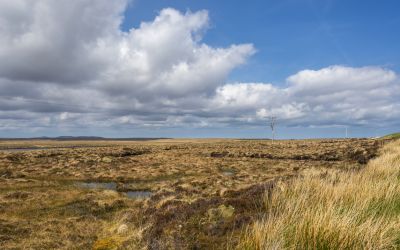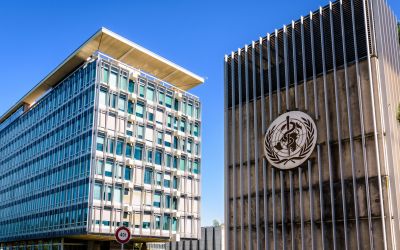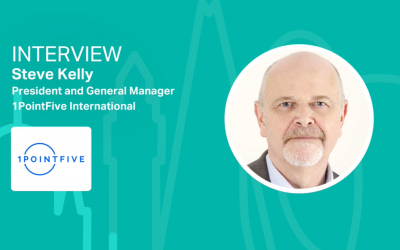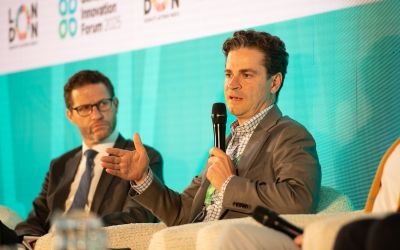Fintan Slye on the importance of policy in driving the decarbonisation of the electricity system
Ahead of the Climate Innovation Forum taking place during London Climate Action Week on July 3rd, we caught up with Fintan Slye, National Grid ESO, to discuss the importance of policy in driving the decarbonisation of the electricity system.

Ahead of the Climate Innovation Forum taking place during London Climate Action Week on July 3rd, we caught up with Fintan Slye, National Grid ESO, to discuss the importance of policy in driving the decarbonisation of the electricity system.
Last month the UK went an entire fortnight without using coal power, how important do you think policy is in accelerating the decarbonisation of the electricity system?
With the recent run of coal records, we’ve really seen the impact of a decade’s worth of climate change policies and how this can help shape industry responses to emerging challenges. Government policy has significantly impacted on the development of both Wind and Solar technologies, allowing private industry to drive the growth of these technologies, to the point that they can now provide electricity at scale effectively and efficiently.
This success in decarbonising electricity generation demonstrates the success that a clear policy vision can have in driving industry action, which we should bear in mind as we move towards the next phase of decarbonisation, for both heating and transportation.
Policy solutions needn’t be the same for all regions of the country, particularly for heating, where the optimal decarbonised heating technology for each village, town and city in this country will be significantly influenced by geography. Whilst we may not be able to utilise a blanket approach to heat decarbonisation, we need policy direction now, to drive the research, development and investment in existing and future technologies that will allow us to tackle this major decarbonisation challenge at scale.
On the transport side, we have already seen significant industry engagement in the development of electric vehicles, to the point that these are now real alternatives to petrol and diesel vehicles. There are less than 200,000 plug-in electric vehicles on the road today but we expect growth to be rapid over the coming years, with up to 10million on the road in next 10 years. However, with smart or intelligent charging this could mean a less than 10% increase in peak electricity demand. Moreover, as electric vehicles demand can be flexible it can charge when the sun is shining or the wind blowing and help facilitate the growth of renewable energy. If done well, policy action around electric vehicles will effectively accelerate the decarbonisation of both transport and energy.
National Grid ESO has said that they will be able to fully operate Great Britain’s electricity system with zero carbon by 2025, what do you think is the key to achieving this?
Zero-Carbon operation by 2025 is a keystone commitment from us as the Electricity System Operator to deliver a significant transformation in how we run Great Britain’s electricity network. To deliver upon this goal we’ve looked carefully at the operational demands that we currently manage, to ensure the safe and efficient transmission of electricity across the country.
Our focus for the next six years will be how to replicate and replace these services currently provided by traditional generators, such as frequency & voltage control, short-circuit infeed and inertia. As a technology neutral company our focus will be to drive the innovation and development of solutions to these challenges rather than to prioritise an individual technology.
We also need to embrace the data and analysis capability that supports our control centre, allowing us to effectively, reliably and securely manage increased levels of renewables.
Delivering on this commitment is a central focus for the ESO moving forwards. This will not only help further decarbonise our electricity use, but will also help to reduce electricity bills for consumers, a critical concern as we move to a sustainable energy future.
What in your opinion are the biggest challenges that the energy industry is facing currently?
As the UK transitions to a low carbon economy, it brings challenges to the way we operate our energy system and markets. The number and range of technologies and market participants has boomed over recent years, radically changing how our network needs to operate as it becomes decarbonised and decentralised. The challenge we now face is how we can continue to deliver the necessary change at pace to create a low carbon economy, whilst ensuring we remove operational and market barriers to entry, for all market participants. By achieving this we believe that this will allow successful businesses operating in competitive markets, with simple, transparent rules to deliver significant value for end consumers.
National Grid ESO has a clear innovation strategy, which of your current projects are you most excited about?
Of all our innovation projects, I would say our work on the Network Innovation Competition project for Distributed Restoration project is the one I’m most excited by. One of the aspects we’ve been looking at as part of our ambition for zero-carbon operation by 2025, is how to reliably replace the coal power stations that are being phased off the grid. As we’ve seen with the week-long runs without coal over May and June, we’re at a point now where coal isn’t playing as significant a role in the wholesale electricity market. One area where coal continues to play a part however is in supporting our black start capabilities. By looking at how Distributed Energy Resources can replace these services, we’re preparing ourselves not only for a grid without coal, but also greater decentralisation of energy, as generation moves away from the large power stations of the last 100 years, to smaller, more flexible, local generation.
You are joining as a guest speaker the Climate Innovation Forum 2019 during London Climate Action Week – how important are the planned discussions at the event in your view?
I’m really looking forward to speaking at the Climate Innovation Forum in a couple of weeks, as I expect it will be an important event for lots of people across the industry and beyond who are interested in the conversations that will be held there. Indeed, one of the major drivers for our involvement in the Forum is the diversity of speakers and interests that will be represented throughout the day, which we think will help drive the conversation away from the normal industry focuses, thanks to the interactivity of some of the sessions.
National Grid ESO is a gold sponsor of the upcoming Climate Innovation Forum on the 3rd July during London Climate Action Week. Register now so you don't miss out on being apart of the important discussions aimed at accelerating the transition to our zero carbon future.






_400_250_s_c1.png)
